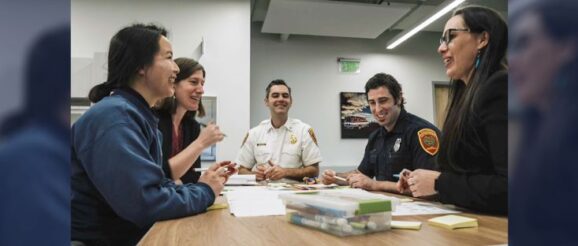Civic Innovation Challenge awards $19M for climate change resilience and community-driven innovation

When a natural catastrophe strikes, how effectively are communities able to marshal access to resources and services? Across the nation, 19 teams of civic leaders and university scholars are working together to improve community effectiveness in responding to these challenges, supported by $19 million from the U.S. National Science Foundation in partnership with the U.S. Department of Homeland Security (DHS) Science and Technology Directorate and the Department of Energy. Additional awards funded by the U.S. Department of Agriculture’s National Institute of Food and Agriculture will be announced shortly. These teams have been selected to conduct and evaluate ready-to-implement pilot projects that are scalable, sustainable and transferable to other communities.
The Civic Innovation Challenge (CIVIC) aims to flip the community-university dynamic, inviting civic leaders to identify priorities ripe for innovation and then partner with universities to develop community-driven solutions. Following a six-month planning phase, 19 teams have been awarded $1 million to conduct and evaluate pilot projects within a 12-month timeframe as part of the second stage of the CIVIC research and action competition. NSF leads the program thanks to funding through the agency’s Directorate for Computer and Information Science and Engineering; Directorate for Engineering; Directorate for Geosciences; Directorate for Social, Behavioral and Economic Sciences; and Established Program to Stimulate Competitive Research, which enhances the research competitiveness of targeted states, territories or commonwealths by strengthening science, technology, engineering and mathematics capacity and capability.
“We are proud to see how investments like the Civic Innovation Challenge awards are igniting a powerful synergy between civic leaders and universities to develop community-driven solutions that forge resilient and equitable futures,” said Margaret Martonosi, NSF assistant director for Computer and Information Science and Engineering. “These $19 million awards represent a commitment to fostering innovation that is effective for American communities and creates opportunities everywhere. We are excited to see how these pioneering pilot programs produce scalable, sustainable, and transferable solutions that empower communities to thrive.”
“The CIVIC Innovation Challenge embodies our dedication to cutting-edge solutions, igniting partnerships and advancing the science that prepares and protects our nation,” said DHS Under Secretary for Science and Technology Dimitri Kusnezov. “The discoveries and solutions generated by this effort will help save lives and enhance resilience for communities across the country.”
CIVIC is comprised of two tracks. Ten teams were selected for Track A, which focuses on living in a changing climate, including pre-disaster action based around adaptation, resilience and mitigation.
The awards for Track A and their Stage 2 goals are listed below:
Nine teams were selected for Track B, which focuses on bridging the gap between essential resources and services and community needs.
The awards for Track B and their Stage 2 goals are listed below:
To learn more about CIVIC, visit the Civic Innovation Challenge website.
